die ideale stadt
__
2004
Aktivist, Eisenhüttenstadt (2007)
Film
DV auf DVD-PAL/16:9
5 min (Loop)
Regie: Maix Mayer
Text: Jan Kuhlbrodt, Maix Mayer Montage: Peter Schüler
2004
Aktivist, Eisenhüttenstadt (2007)
Film
DV on DVD-PAL/16:9
5 min (loop)
Directed by: Maix Mayer
Text: Jan Kuhlbrodt, Maix Mayer
Editing: Peter Schüler

Filmstill
Movie still
Das Technische Museum Hongkong besitzt ein mechanisches Diorama, das den Ausstieg von zwei Raumfahrern aus ihrer Basisstation darstellt. Während die Figuren durch den abgedunkelten Raum gleiten und verschiedene Aufgaben erfüllen, ist der Sprechfunkverkehr zwischen ihnen in chinesischer Sprache zu hören.
Der Film zeichnet diese Szenen in einem Ausschnitt auf, der das Diorama verfremdet und als Filmanimation erscheinen lässt. Die gesamte mechanische Animation des Ausstiegs und der Rückkehr wurde gefilmt, wodurch im Material die Präsentation als Loop („Schleife“) angelegt ist. Bei der Bearbeitung des Materials erfolgte eine akustische Inszenierung. In die Filmbilder wurde ein Fließtext eingefügt, der scheinbar im Rhythmus des Originaltons ein Gespräch über „die ideale Stadt“ wiedergibt. Die Untertitel erscheinen als Übersetzungen, die mechanische Animation als eine Art Science-Fiction-Film.
The technical museum in Hong Kong is home to a mechanical diorama showing two astronauts leaving their base station. While these figures glide through the darkened space, carrying out various tasks, the radio communication between them can be heard in Chinese.
The film records these scenes in one section that creates an alienating effect between the viewer and the diorama, showing it as an animation. The entire mechanical animation of the departure and return was filmed, and in this material, the presentation is shown in a loop. An acoustic element was added, with subtitles that seem to be in the rhythm of the original sound, of a conversation about “die ideale Stadt.” The subtitles appear in translation, the mechanical animation as a kind of science fiction movie.

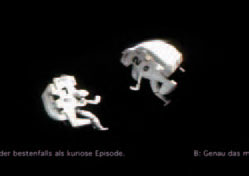
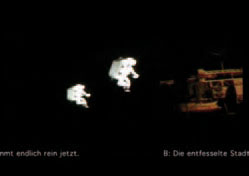
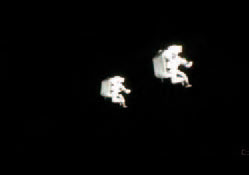
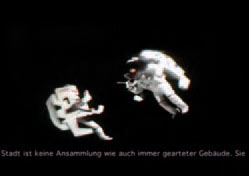
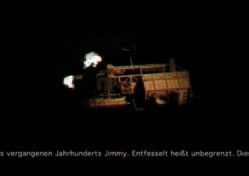
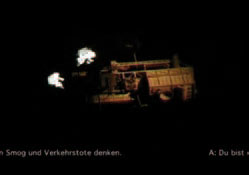
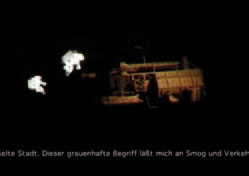
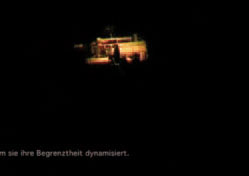
Filmstills
Movie stills
A, B: Stimmen der beiden Kosmonauten im Weltraum
C: Funkstimme aus dem Kontrollcenter
Die ideale Stadt
A: Es ist und bleibt paradox. Der Stadtraum ist ein begrenzter Raum. Die ideale Stadt aber, sollte sie jedem ihrer Bürger unbegrenzte Freiheit garantieren wollen, müsste selbst unbegrenzt sein. Die ideale Stadt gibt es weder, noch ist sie denkbar. Denn die Konstruktion der Utopie folgt einem historisch determinierten Impuls, einer Vorstellung von Stadt, die sich während ihrer Realisierung schon verändert hat. Anders gesagt ist die fertiggestellte Idealstadt am Tag ihrer Einweihung schon ein Fall für das Museum.
C: Eure Sophistereien bringen uns nicht weiter, wir haben konkrete Aufgaben zu l sen. Macht euren Job.
B: Du denkst zu kurz, Jimmy. Du gehst deiner eigenen Vorstellung von Zeitlichkeit auf den Leim. Die heute gültige Mode kennt keine Utopie, weil sie sich ihrer eigenen verweigert. Aber das ist nur ein Reflex auf misslungene Umsetzung. Ein postutopischer Kater sozusagen.
A: Aber sind nicht alle Versuche der Verwirklichung einer Utopie in autoritäre Systeme gemündet? Ist nicht jede Idealstadt zu einem Vorort verkommen und rottet nun langsam vor sich hin?
Nehmen wir Brasilia. Durchgeplant nach allen m glichen Gesichtspunkten. Ökonomisch, sozial, repräsentativ. Eine solche Stadt kann einen sensiblen Künstler doch nur zu einer Satire wie Brazil inspirieren.
B: Du triffst den Nagel auf den Kopf. Der Antrieb der Idealstadt war ein utopischer. Ihr Haken war die angestrebte Idealität. Es war der Versuch, gleichzeitig sauber und rebellisch zu sein.
C: Ich fordere euch noch einmal auf, eure Arbeit zu machen. Hier gehen ständig fremde Signale ein. Wir brauchen euch hier drinnen. Wei Gott, woher die Signale kommen. Ich habe so etwas noch nie gesehen.
A: Nehmen wir die Kugel. Das Runde, die Form. Eine Stadt ohne Ecken und Kanten gewissermaßen. Eine Stadt ohne Reibung, eine Stadt, wo eines ins andere greift. Es war das mechanistische Denken der Ingenieure, das die Utopien scheitern lie .
Das Symbol für ihr Denken ist die Kugel. Ein Ort, der inmitten aller Begrenztheit einen Akt der Freiheit suggerieren will. Es ist aber nur die Freiheit des Spießers, die sich hier zeigt. Eine Scheinfreiheit. Eine virtuelle Grenzenlosigkeit, die sich, tritt man einen Schritt zurück, als kugelrunder Knast zu erkennen gibt oder bestenfalls als kuriose Episode.
B: Genau das meine ich, wenn ich sage, dass die ideale Stadt schlicht nicht denkbar ist.
C: Kommt rein Leute, ich glaube, wir haben es geschafft. Jimmy, wir haben Kontakt. Kommt rein jetzt.
A: Wenn man die Stadt und die Freiheit statisch und mechanistisch denkt. Aber Freiheit und Stadt sind ein dynamischer Prozess. Die ideale Stadt ist keine Ansammlung wie auch immer gearteter Gebäude. Sie ist ein Kosmos, reicht ins Unbegrenzte, indem sie ihre Begrenzung immer nur als temporäre begreift. Der Abriss ist der utopischen Stadt genauso wichtig wie der Aufbau. Die Entsorgung verworfener Gedanken ist ihr so essenziell wie die Müllabfuhr. Ich möchte sie die entfesselte Stadt nennen.
C: Kommt endlich rein jetzt.
B: Die entfesselte Stadt. Dieser grauenhafte Begriff lässt mich an Smog und Verkehrstote denken.
A: Du bist ein Kind des vergangenen Jahrhunderts, Jimmy. Entfesselt hei t unbegrenzt. Die entfesselte Stadt stellt das Universum selbst als potenziellen Stadtraum vor. Sie ist die Überwindung der Paradoxie, indem sie ihre Begrenztheit dynamisiert.
C : voice of mission control
The ideal city
A: It is a paradox and will remain so. A city occupies a limited space. But the ideal city, if it aims to guarantee unlimited freedom to every one of its citizens, has to be unlimited itself. The ideal city does not exist, nor can it be imagined. Because the construction of the utopia follows a historically determined impulse, an idea of a city, which has already changed its own realization. In other words, the completed ideal city belongs in a museum on the very day it is opened.
C: Your sophistry gets us nowhere, we have specific tasks to do. Get on with them.
B: You don’t think ahead, Jimmy. You are fooled by your own perception of the temporal. Today’s fashion does not recognize any utopia because it refuses to accept its own. But that is nothing more than a reflex against failed implementation. A post-utopian hangover, so to speak.
A: But haven’t all the attempts at creating an earthly utopia ended in authoritarian systems. Hasn’t the ideal city degenerated into a suburb and is rotting slowly away.
Take Brasilia. It was thoroughly planned in every way possible – to be economical, social, and imposing. But a city like that can only inspire a sensitive artist to make a satire like Brazil.
B: You’ve hit the nail on the head. The impetus behind the ideal city was a utopian one. The problem was the ideal character it strove for. It was the attempt to be clean and rebellious at the same time.
C: I call on you again to do your work. We keep getting strange signals. We need you in here. God knows where the signals are coming from. I’ve never seen anything like it.
A: Take the sphere. The round, the shape. A city without corners and edges, more or less. A city without friction, a city, where each thing is integrated into another. It was the mechanistic thinking of engineers that made the utopias fail. The symbol for their thinking is the sphere. A place, which in the middle of all the limitations, suggests an act of freedom. But it is only the freedom of the petit bourgeois that we see here. It only appears to be freedom. It is a virtual unlimitedness, which, if you take a step back, reveals itself to be a perfectly round prison, or at best, a curious episode.
B: That’s exactly what I mean when I say that the ideal city simply cannot be imagined.
C: Come in you guys, I think we’ve made it. Jimmy, we have made contact. Now come in.
A: If you think of the city and of freedom statically and mechanistically. But freedom and the city are a dynamic process. The ideal city is not a collection of any kind of buildings. It is a cosmos, reaching to the infinite by only ever comprehending its limitations as temporary.The tearing-down of the utopian city is just as important as the construction. Disposing of rejected ideas is just as essential to it as the collection of garbage. I would like to call it the unfettered city.
C: Come in now, it’s time.
B: The unfettered city. That sounds horrible - it makes me think of smog and traffic deaths.
A: You are a child of the last century, Jimmy. Unfettered means unlimited. The unlimited city imagines the universe itself as its potential space. It overcomes the paradox because it makes its limitations dynamic.
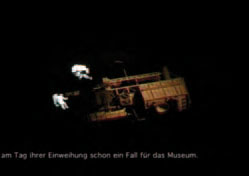

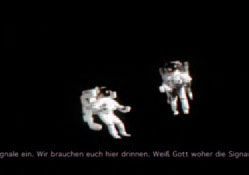
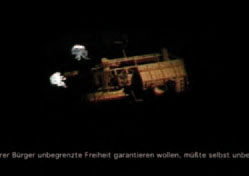
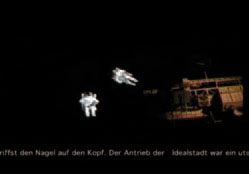
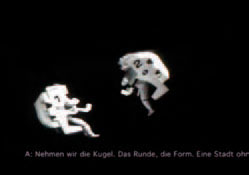

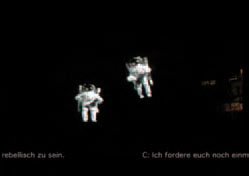

Filmstills
Movie stills

